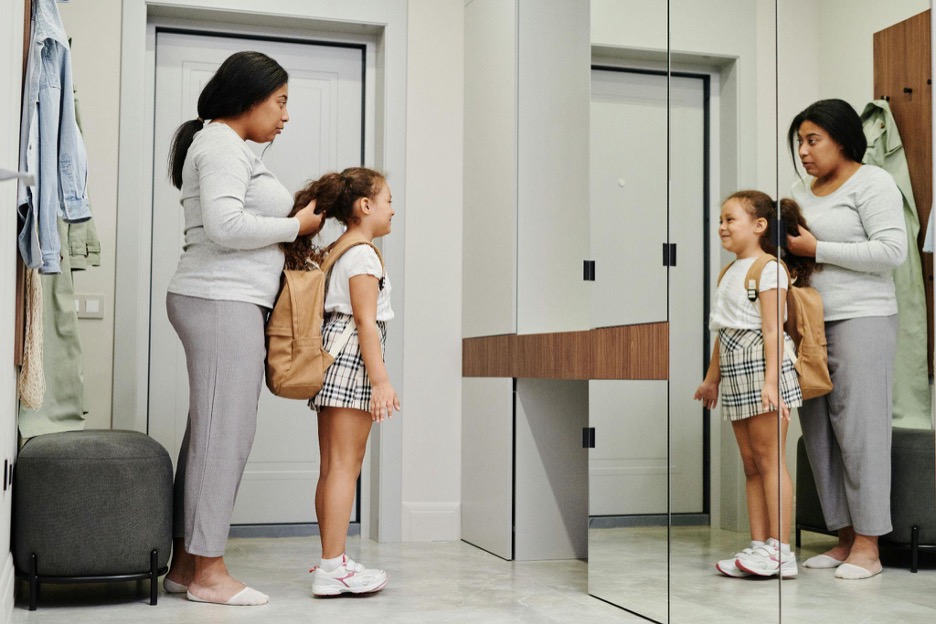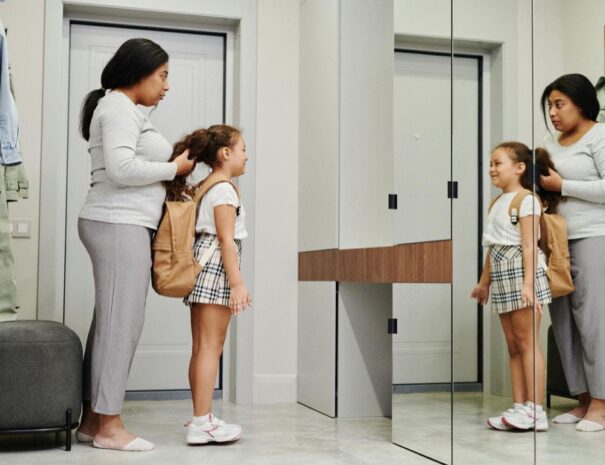Co-parenting means that separated or divorced parents work together to raise their children. This approach prioritizes the child’s well-being by keeping both parents actively involved. In this article, we will explore what co-parenting mean, covering the essentials from key elements to practical tips and common pitfalls.
Key Takeaways
- Co-parenting is a collaborative effort that prioritizes the child’s well-being, ensuring both parents are actively involved in their lives post-separation or divorce.
- Key elements for successful co-parenting include effective communication, building trust, and establishing clear boundaries to foster a stable environment for children.
- Utilizing tools and seeking professional help can enhance the co-parenting experience, ensuring mutual respect and effective management of responsibilities.
Defining Co-Parenting

Co-parenting involves parents sharing responsibilities and working together as a team for their children. This collaborative approach focuses on raising children effectively after separation or divorce, ensuring that both parents remain actively involved in their child’s life. It’s more than just a division of labor; it’s about maintaining a co-parenting relationship that prioritizes the child’s well-being and stability.
Effective co-parenting involves collaboration and a shared commitment to the children’s well-being. Providing safety, security, and love from both parents helps children adjust and cope better with changes in family dynamics.
The aim is to prioritize the child’s needs and maintain a nurturing environment where they can thrive despite the parents’ separation, ultimately supporting the child’s life.
Evolution of Co-Parenting
Historically, parenting has often involved collaboration among multiple adults, not limited to just biological or adoptive parents, reflecting diverse social and cultural practices. Over time, parental roles have evolved significantly, with increased recognition of the importance of fathers and other caregivers in the upbringing of children beyond mere biological ties. This shift has led to a more inclusive and collaborative approach to raising children, emphasizing the shared responsibilities of both parents.
The concept of co-parenting has also been influenced by legislative changes and societal campaigns advocating for the involvement of all parents, regardless of marital status. As societal norms have shifted, there is now a greater emphasis on ensuring that children maintain strong relationships with both parents after separation. This evolution reflects a growing recognition that the involvement of both parents is crucial for the child’s well-being and development.
Here are some popular article recommendations you might love to explore:
- Effective Co-Parent Strategies for Harmonious Parenting
- Top Tips on Co-Parenting for a Healthy Family Dynamic
- Coping with Parents Divorcing: Essential Tips for Children
Key Elements of Co-Parenting
Successful co-parenting hinges on several key elements that create a stable and supportive environment for children. These elements include effective communication strategies, building trust, and establishing clear boundaries.
Each of these components plays a vital role in ensuring that co-parents can work together harmoniously, even if they have different parenting styles.
Communication Strategies
Effective communication in co-parenting requires active listening, empathy, and understanding different perspectives. Open and regular discussions about the child’s well-being are crucial. Parents should communicate respectfully and non-confrontationally, avoiding negative language or derogatory nicknames that can harm the relationship.
Clear communication helps prevent misunderstandings and fosters cooperation. Establishing rules about communication methods is vital for a successful co-parenting strategy. Respectful and constructive dialogues create an environment prioritizing the child’s best interests and emotional well-being.
Building Trust
Building trust in co-parenting improves emotional well-being, encourages healthy relationships, and boosts self-esteem. Trust is vital for respecting boundaries and ensuring accountability. Transparency fosters reliability and mutual respect between co-parents.
Trust develops through consistent actions, keeping commitments, and reliability. When co-parents trust each other, they create a stable and supportive environment for children to thrive, allowing them to focus on development and social interactions without parental conflict stress.
Establishing Boundaries
Establishing boundaries in co-parenting creates stability and predictability for the child, fostering a respectful dynamic. Clearly defined boundaries help maintain respect, ensuring both parents understand their roles and responsibilities. This includes setting guidelines for discipline to ensure consistency across both households.
These boundaries collectively create a structured and nurturing environment for children post-separation. Respecting each other’s boundaries and maintaining a consistent parenting approach provides stability and support, promoting the child’s well-being and adjustment.
Types of Co-Parenting Arrangements
Co-parenting arrangements can take various forms, each with its own set of advantages and challenges. Cooperative co-parenting involves both parents collaborating to make decisions about the child’s upbringing, ensuring a unified approach to parenting. This arrangement works well when both parents can communicate effectively and respect each other’s input.
Parallel parenting, on the other hand, allows separated parents to operate independently with minimal communication. This can be beneficial in high-conflict situations but may result in a lack of consistency in the child’s life.
Another arrangement is nesting, where parents move in and out of the family home while the children remain there. While this ensures stability for the children, it can pose challenges like limited personal space for each parent.
Co-parenting arrangements can evolve over time, and regular revision of the co-parenting plan is crucial to adapt to changing family needs.
Creating a Co-Parenting Plan
A well-thought-out co-parenting plan is crucial for success. Specify how decisions related to the child’s education and medical care will be made. Identifying responsibility for child-related expenses prevents misunderstandings. A comprehensive plan should also detail how to address schedule changes and procedures for unexpected events such as missed visits.
The plan should outline travel protocols, including permission requirements for out-of-state travel with the child. Counselors can assist in developing a co-parenting plan that includes schedules, decision-making processes, and communication methods.
A clear and flexible plan allows co-parents to navigate the complexities of parenting post-separation more effectively.
Tools and Resources for Co-Parents
Several tools and resources can help co-parents manage responsibilities more effectively. The Our Family Wizard platform offers a secure space for shared family information, enabling schedule management, communication, and expense tracking. Similarly, 2houses.com provides tools for better communication and organization, including shared calendars, photo albums, and journals designed for co-parents.
Talking Parents is another free communication tool that helps co-parents keep accurate records of conversations and important dates. Support groups like Children Of Divorced Parents provide a community for those affected by divorce to share experiences and receive advice.
Effective tools and resources can greatly enhance the co-parenting experience and support children’s well-being.
Seeking Professional Help
Seeking professional help can be invaluable for co-parents facing challenges. Family therapists and counselors provide guidance in communication, conflict management, and emotional issues. Co-parenting counseling focuses on establishing effective communication and conflict resolution skills. Strategies for managing disagreements constructively are taught during counseling.
Counselors provide a secure environment for co-parents to discuss challenges and work towards mutually beneficial solutions. Co-parenting therapy often includes a mix of individual and joint sessions to address specific concerns and improve understanding.
Professional help allows co-parents to set healthy boundaries, ensuring they respect each other’s time and parenting roles.
Benefits of Successful Co-Parenting
Successful co-parenting benefits both children and parents. It promotes the idea that children benefit from having access to both parents, leading to better emotional and physical health outcomes. Cooperative co-parenting can improve physical health outcomes for children due to a less stressful family climate. Healthy co-parenting enhances children’s emotional security, allowing them to focus on their development and social interactions.
Effective co-parenting reduces stress for children by minimizing conflicts and providing a stable environment. Cooperation between parents contributes to better decision-making and time management, benefiting both parents and children. Working together, co-parents can create a nurturing environment that supports their child’s well-being and adjustment.
What Not to Do in Co-Parenting
While many positive strategies exist for co-parenting, it’s equally important to be aware of what not to do. Common pitfalls include negative communication, unilateral decisions, and involving children in conflicts. Badmouthing the other parent in front of children can lead to resentment and is considered parental alienation. Threatening to call authorities on the other parent can be seen as an attempt to manipulate custody arrangements.
Conflicted co-parenting involves active disputes and emotional disengagement, leading to detrimental effects on children. To avoid these pitfalls, co-parents should maintain respectful communication, make joint decisions, and keep children out of adult conflicts.
Summary
In summary, co-parenting is a collaborative approach that focuses on the child’s well-being and involves sharing responsibilities between both parents. From defining co-parenting and understanding its evolution to exploring key elements and different arrangements, this blog post has provided a comprehensive guide to successful co-parenting.
By creating a solid co-parenting plan, utilizing tools and resources, seeking professional help, and avoiding common pitfalls, co-parents can foster a healthy and supportive environment for their children. Remember, successful co-parenting is about cooperation, communication, and commitment to your child’s best interests.
Frequently Asked Questions
What is co-parenting?
Co-parenting is all about parents collaborating and sharing responsibilities to ensure the well-being and stability of their children. Embrace this teamwork for a positive impact on their lives!
How has the concept of co-parenting evolved?
Co-parenting has evolved significantly with changes in laws and societal attitudes, emphasizing the vital role both parents play in a child’s development. Embrace this shift and work together for the best interests of your child!
What are the key elements of successful co-parenting?
Successful co-parenting hinges on effective communication, building trust, and setting clear boundaries. Embrace these elements to create a stable and nurturing environment for your children!
What types of co-parenting arrangements exist?
Cooperative co-parenting, parallel parenting, and nesting are effective arrangements, each offering unique benefits to help you navigate parenting successfully. Choose the one that aligns best with your family’s needs for a harmonious experience!
Why is seeking professional help important in co-parenting?
Seeking professional help in co-parenting is crucial because it equips you with effective communication and conflict management skills, fostering a healthier relationship for the benefit of your children. Embrace this support to create a positive co-parenting environment!









